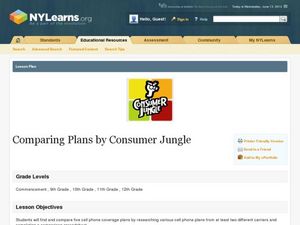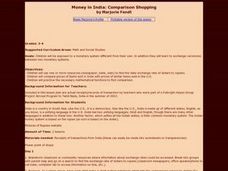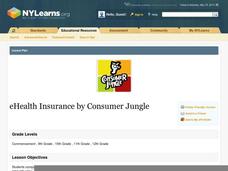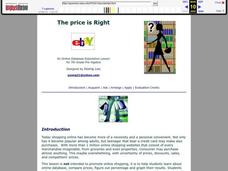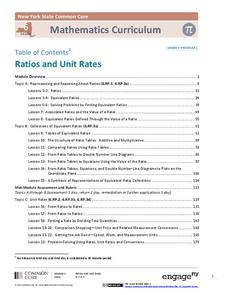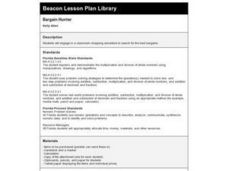Curated OER
Take Math Shopping!
Percents, estimation, and comparative analysis become more understandable when they are used in-context at the grocery store.
Practical Money Skills
Shopping Wisely
Work on making good shopping choices with a fun economics project. Kids analyze the differences between brand names and generic products, bigger and smaller units for purchase, and different places they can shop for different items.
Curated OER
Shopping-Unit Pricing
Comparing unit prices of food products is a skill that learners will use for the rest of their lives. Here is a simple plan that provides practice calculating the unit price for various grocery store products. Use two jars with differing...
Curated OER
All The Bell & Whistles
Young adults are so eager to get that first cell phone. And, cell phones have so many cool extras! Learners conduct real-life research to determine which cell phone carrier offers the best deals on things like wall paper, ringtones, and...
Curated OER
Comparing Plans
Good consumer practices such as price comparison can make or break a budget. Youngsters research five different cell phone carriers and the plans they offer. They compile their data and determine which plan offers the best value. They...
Curated OER
Shopping the Sunday Circular
Pupils demonstrate an understanding of price-per-unit mathematics. In this computation lesson, learners accurately figure the unit price of grocery items. They create a chart and record the item, the price, the size and the cost per item.
EngageNY
Comparison Shopping—Unit Price and Related Measurement Conversions
Speed up your scholars' understanding of ratios. Class members compare ratios related with speeds presented in different representations. They then use the unit rates to make the comparisons.
EngageNY
Random Sampling
Sample pennies to gain an understanding of their ages. The 16th installment of a 25-part series requires groups to collect samples from a jar of pennies. Pupils compare the distribution of their samples with the distribution of the...
Curated OER
The Price Is Right - Grocery Store Prices
Eighth graders use the unit price to compare which local grocery store has the best prices. Assign students to work with a partner and a role. One person is the recorder and the other is the mathematician.
EngageNY
Comparison Shopping—Unit Price and Related Measurement Conversions II
Which rate is greater and by how much? Pupils continue to compare rates to solve problems in the 20th portion of a 29-part series. Rates are presented in a variety of representations either using the same representation or different...
Curated OER
Selecting Lower Priced Grocery Items
As adults, most individuals with special needs must live on a budget. Provide them with money management skills by teaching your class how to make price comparisons while shopping at the grocery store. They work through a series of...
Curated OER
Coupon Clippers: Understanding Comparative Shopping
Third graders participate in a shopping spree after listening to Pigs Go to Market: Fun with Math and Shopping. After the story is read aloud, 3rd graders answer discussion questions and review key vocabulary. Students complete provided...
Curated OER
Money in India: Comparison Shopping
Students are exposed to a monetary system different from their own. They learn to exchange currencies between two monetary systems. Practice the necessary mathematical functions to find comparison. Compare prices of items sold in India...
Curated OER
Shots, Standings, and Shopping
Rates and ratios can easily be applied to real-world situations. Learners explore a series of websites in order to procure comparable data. They define ratios and rates, view videos, and use the internet to explore how ratios and rates...
Illustrative Mathematics
Price per Pound and Pounds per Dollar
Help learners understand the concept of unit rate as it is applied to buying beans at a grocery store. The objective is to determine the unit rate in two ways, and then apply each ratio to an additional problem. The attached commentary...
PLS 3rd Learning
eHealth Insurance
Comparison shop for health insurance? Yep. Young adults compare and contrast several health insurance plans to determine which would provide the most coverage at the best price. They discuss and work through deductibles, premiums, and...
Curated OER
Cost Comparison
Students take a tour of a produce department in a grocery store. They explore the concepts of money and a budget. They complete problem solving activities and taste different fruits and vegetables.
Curated OER
The Price is Right
Students, through various activities, explore online databases. Using the internet, students explore the distributors websites. They collect specific information on selected products. An spreadsheet with price comparisons is developed....
Curated OER
Comparison Food Shopping: Buying Groceries for Two People for One Week
Twelfth graders investigate how to develop a simple food budget for two using newpaper ads, the basic four food groups, and calorie counts.
EngageNY
Ratios and Unit Rates
This turn-key unit on ratios and unit rates walks through a 30-lesson unit on teaching proportional reasoning, with each lesson broken into detailed teaching notes and time allotments for all parts. An unbelievable resource when taken...
Curated OER
Bargain Hunter
Students engage in a classroom shopping adventure to search for the best bargains.
Curated OER
Shop 'Til You Drop
Students compare food prices to find the lowest unit price and make choices about where to shop and what to purchase on weekly items, cost comparisons and items needed. They collect grocery ads and weekly sale flyer's to expedite their...
Curated OER
Made Round To Go Round
In this lesson students investigate what it would cost to furnish one room of their choice by shopping on the Internet. Both Australian and American dollars are to be given for each item to demonstrate the difference between two...
Visa
Money Matters: Why It Pays to Be Financially Responsible
What does it mean to be financially responsible? Pupils begin to develop the building blocks of strong financial decision making by reviewing how their past purchases are examples of cost comparing, cost-benefit analysis, and budgeting.






